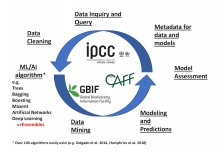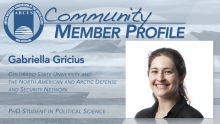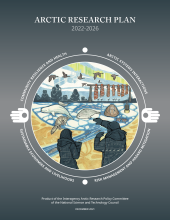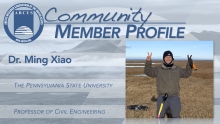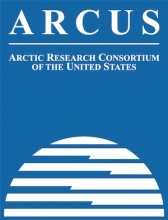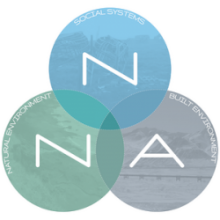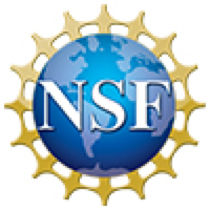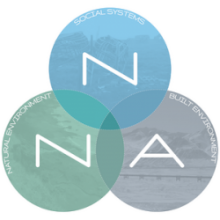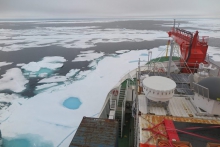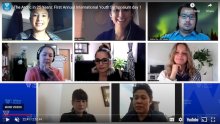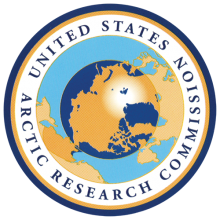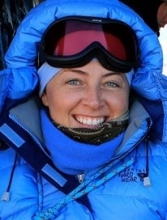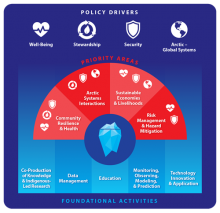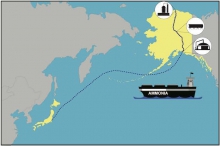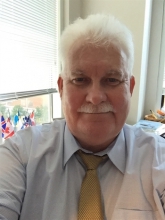Witness Community Highlights is an online publication launched in May 2017 to complement the regular publications of Witness the Arctic. It was developed in response to community feedback identifying the need for a monthly publication to highlight 1–2 Arctic research efforts and other timely items of interest to our readers. Community Highlights is distributed monthly via our Witness the Arctic mailing list of over 8,600 subscribers.
Artificial Intelligence and Machine Learning Tools for Arctic Research
For the Arctic and the polar regions, accurate data mining and forecasting are a basis for good decision-making. Artificial Intelligence (AI) and Machine Learning (ML) offer tools and new approaches to obtain powerful and best-possible predictions for inference and policy for the current time period, as well as for the future.
By: Falk Huettmann, Institute of Arctic Biology, University of Alaska Fairbanks
COVID-19 in Remote Alaska Communities: A Longitudinal View of a Novel Pandemic
Throughout the COVID-19 pandemic, there has been an urgent need to understand the impacts on daily life in remote Alaska. Researchers used an ecosocial approach that allowed analyses and interpretation based on the fact that the health and well-being of individuals and populations are dependent on and manifested through multi-level pathways linking biological, ecological, and social organization factors to one another. Study results provide evidence to tribal health organizations and community leaders to support past and ongoing pandemic responses.
By: Ruby Fried, University of Alaska Anchorage (UAA), Institute for Circumpolar Health Studies (ICHS); Micah Hahn, UAA, ICHS; Patricia Cochran, Inupiaq Elder, Alaska Native Science Commission; and Laura Eichelberger, Alaska Native Tribal Health Consortium, Research Services, Tribal Water Center
ARCUS Member Profile of Gabriella Gricius
ARCUS Community Member Profiles highlight our individual members and member representatives. They are short, easy-to-read profiles to help the ARCUS community get to know one another and support connections across disciplines and perspectives. This Profile features Gabriella Gricius, PhD Student in Political Science at Colorado State University and the North American and Arctic Defense and Security Network. A transcript of the related interview accompanies the Member Profile and provides further information.
Fourth International Conference for Arctic Research Planning
The International Arctic Science Committee (IASC) is coordinating a multi-year planning process for the Fourth International Conference for Arctic Research Planning (ICARP). This process will engage Arctic researchers, policy makers, residents, and stakeholders from around the world to discuss the state of Arctic science, the place the Arctic occupies in global affairs and systems, to consider the most urgent knowledge gaps and research priorities that lie before us, and to explore avenues to address these research needs.
By Larry Hinzman, International Arctic Science Committee (IASC) President; Matthew L. Druckenmiller, US Delegate to IASC; Gerlis Fugmann, IASC Executive Secretary; Andrey N. Petrov, Alternate US Delegate to IASC; and Federica Scarpa, IASC Communications Manager
Supporting Collaboration and Equitable Knowledge-Sharing Within and Beyond the Navigating the New Arctic (NNA) Initiative
The Navigating the New Arctic Community Office (NNA-CO) was formed in February 2021. As a distributed office across across three universities, efforts focus on engaging and supporting Arctic communities in diverse ways and developing training resources to assist researchers in ethically and equitably partnering with Arctic communities; facilitating connections among NNA researchers and communities, teachers, and students across Alaska and beyond; and providing overall coordination and developing partnerships across US and international Arctic research communities.
By Matthew L. Druckenmiller, Navigating the New Arctic Community Office (NNA-CO) Director; Jenna Vater, NNA-CO Program Manager; and Karli Tyance Hassell, NNA-CO Indigenous Engagement Coordinator
Arctic Research Plan 2022–2026: A Bold Strategy for a Changing Arctic
The new Arctic Research Plan 2022–2026, released by the Interagency Arctic Research Policy Committee (IARPC), outlines key research goals that will address community resilience and health, Arctic systems interactions, sustainable economies and livelihoods, and risk management and hazard mitigation. Where the Arctic Research Plan 2022–2026 provides the high-level strategy and goals for federal investment in Arctic research, new two-year implementation plans will be more granular, providing specific and tangible objectives and deliverables. The first implementation plan will run from September 2022 through October 2024. IARPC invites the Arctic research community to share input on what should be included in the first biennial implementation plan.
By: Liz Weinberg, Web Manager and Community Coordinator, Interagency Arctic Research Policy Committee
ARCUS Member Profile of Ming Xiao
ARCUS Community Member Profiles highlight our individual members and member representatives. They are short, easy-to-read profiles to help the ARCUS community get to know one another and support connections across disciplines and perspectives. This Profile features Ming Xiao, a Professor of Civil and Environmental Engineering at Penn State University. A transcript of the related interview accompanies the Member Profile and provides further information.
ARCUS Member Highlights from the 2021 Annual Meeting
The 2021 ARCUS Annual Meeting brought together 128 members of the Arctic research and education communities to meet, talk, and connect. The event provided opportunities for participants to share what they and their organizations are doing to address key challenges and opportunities in Arctic research and identify actionable ways for people to work together and support each other. In preparation for the meeting, ARCUS Member Representatives from eight of ARCUS' 27 member institutions shared a few recent activity highlights from their home institutions. This article includes summaries of, and links to, those Member Updates.
By: Katherine Schexneider, ARCUS Volunteer; and ARCUS Staff
Investing in Inuit Futures
The Inuit Futures in Arts Leadership: The Pilimmaksarniq / Pijariuqsarniq Project supports Inuit and Inuvialuit to become leaders within their communities in all areas of the arts. The project focuses on providing hands-on mentoring and training opportunities for Inuit Futures students/learners who undertake research in the arts, participate in other Inuit-led artistic projects, or gain valuable skills and knowledge by participating in paid internships within our network of arts institutions across the Canadian North and South. These experiences improve their readiness for careers in the arts as well as creating a new generation of knowledge creators.
By: Napatsi Folger, alumna of the Inuit Futures in Arts Leadership: The Pilimmaksarniq/Pijariuqsarniq Project, and Associate Editor for Inuit Art Quarterly
Introduction by Danielle Aimée Miles, Research and Administrative Coordinator, Inuit Futures in Arts Leadership: The Pilimmaksarniq / Pijariuqsarniq Project
Planning Grants Awarded by NSF's Navigating the New Arctic Program
As part of its Fiscal Year 2021, NSF's Navigating the New Arctic Program awarded funding to several Planning Grants. These grants support efforts of developing convergence teams from disparate disciplines and communities to tackle projects of larger scope in the future.
Editors: ARCUS Staff
Jennifer Mercer Appointed as Section Head for the Arctic Sciences Section, NSF Office of Polar Programs
Dr. Jennifer Mercer has been appointed as Section Head for the Arctic Sciences Section within the Office of Polar Programs effective October 25, 2021. Mercer has a broad scientific background with extensive field experience in both the Arctic and Antarctic. She has been conducting research and leading projects in remote field locations for over two decades with efforts on all seven continents, as well as four ocean research vessels.
By: NSF Office of Polar Programs Staff
NSF's Navigating the New Arctic Program: Recently Funded Projects
In a special report, "NSF expands Arctic investment through the Navigating the New Arctic Initiative" published in early September 2021, NSF announced the funding of 17 projects as part of its Fiscal Year 2021 awards for the NNA program. The awards, totaling $32 million, support 96 investigators across 38 institutions, as well as students, and postdoctoral scholars. The NNA program, with its focus on convergence research across the social, natural, and built environment, supports projects with the potential for meaningful engagement with Arctic communities. Summaries of funded projects are highlighted in this article.
Editors: ARCUS Staff
Interview with ARCUS Member Sasha Liedman
A new ARCUS Member Profile product is featured in this interview between ARCUS volunteers Katherine Schexneider and Sasha Leidman. This interview and the Member Profile are the first in a new series developed to highlight the work of our individual members and help ARCUS members get to know one another, by supporting connections across disciplines, communities, and career paths.
By: Katherine Schexneider, ARCUS Volunteer
Ethnography of and during the Pandemic Era in Alaska
Ongoing research funded through an NSF RAPID grant, seeks to identify the sources of Indigenous community strength and resilience amidst the COVID-19 pandemic at two sites in Alaska: the village of Gambell, St. Lawrence Island, and Galena, in interior Alaska. Working collaboratively with community-based partners, researchers are investigating local pandemic responses in the areas of safety, security, and vitality.
By: Sveta Yamin-Pasternak, University of Alaska Fairbanks (UAF); Christina Edwin, Community-Based Partner; Marina Koonooka, Community-Based Partner; Jake Pogrebinsky, Community-Based Partner; and Igor Pasternak, UAF
Accelerated Sea Ice Loss in the Wandel Sea Points to a Change in the Arctic’s Last Ice Area
The Arctic Ocean’s Wandel Sea is the easternmost sector of the Last Ice Area, where thick, old sea ice is expected to endure longer than elsewhere. Nevertheless, in August 2020 the area experienced record-low sea ice concentration. Led by a team from the University of Washington Applied Physics Laboratory, investigators used satellite data and sea ice model experiments to determine what caused this record sea ice minimum.
By: Axel J. Schweiger, University of Washington Applied Physics Laboratory (UW/APL); Michael Steele, UW/APL; Jinlun Zhang, UW/APL; G. W. K. Moore, University of Toronto; and Kristin L. Laidre, UW/APL.
One Health, One Future 2021
The University of Alaska Center for One Health Research hosted the virtual One Health One Future conference in April 2021. This international conference brought together scientists, health care providers, policy makers, agency workers, students, and community members to present and discuss One Health issues facing the circumpolar north.
By: Arleigh Reynolds, Director University of Alaska Fairbanks (UAF) Center for One Health Research; Kelsey Nicholson, Program Administrator, UAF Center for One Health Research; and Hannah Robinson, Master's Program Coordinator, UAF Center for One Health Research
Studying the Potential for Changing Global Seaborne Trade Flows as a Consequence of a Thawing Arctic Ocean
A changing climate has brought a thawing of the Arctic Ocean with increasingly viable passageways. This opening of the Arctic routes over coming years is likely to lead to a shift in the flow of cargo across world seaborne trade lanes. This NSF-funded NNA project is developing capabilities to forecast conditions along these passageways to understand related risks.
By: Elise Miller-Hooks, George Mason University; Sara Cobb, George Mason University; Celso Ferreira, George Mason University; Anne Garland, ARIES; Ralph Pundt, Maine Maritime Academy; Thomas Ravens, Consultant; and Jinlun Zhang, University of Washington
Circumpolar Collaboration: An Arctic Youth Perspective
From her experiences organizing an international Arctic youth symposium, as well as related volunteer and travel experiences, Michaela Stith observes that solutions to systemic problems like climate change and racism will not come with a quick or technical fix. It will take a culture shift to develop deep relationship-building and policy change.
By: Michaela Stith, Program Assistant, Polar Institute, the Wilson Center
Observing the Cycle of Ice through Fresh Eyes
The NSF-funded Fresh Eyes on Ice project is revitalizing and modernizing river and lake ice observations in Alaska through archiving and analyzing existing historic datasets, remote sensing, field studies, real-time cameras and buoys, and community-based monitoring. Documenting changes in break-up, freeze-up, and other ice dynamics of river and lake ice help detect responses to climate change.
By: Chris Arp, Water and Environmental Research Center, University of Alaska Fairbanks (UAF); Katie Spellman, International Arctic Research Center, UAF; Laura Oxtoby, Water and Environmental Research Center, UAF; and Dana Brown, Institute of Arctic Biology, UAF
Broadening Participation in Freshwater Ice Science and Education with Fresh Eyes on Ice
The community science dimension of the Fresh Eyes on Ice project establishes a baseline of geographically diverse measurements and observations, and ground-truthing data for comparison with the other types of data being collected remotely. The project elevates local perspectives on these data, provides opportunity for ice safety information sharing, and facilitates science learning.
By: Katie Spellman, International Arctic Research Center, University of Alaska Fairbanks (UAF); Laura Oxtoby, Water and Environmental Research Center, UAF; Chris Arp, Water and Environmental Research Center, UAF; and Dana Brown, Institute of Arctic Biology, UAF
President Biden Changes Leadership of US Arctic Research Commission
The White House informed US Arctic Research Commission (USARC) Commissioners and staff that President Biden designated David Kennedy as Chair of the USARC, effective 3 March 2021. Kennedy succeeds Jon Harrison as Chair, and both continue to serve on the commission. Mr. Kennedy has over 50 years of experience and leadership in science, research, environmental management, and development of legislation and national initiatives.
By: Cheryl Rosa, US Arctic Research Commission Deputy Director
Appointment of Dr. Jennifer Mercer as Acting Section Head for NSF Office of Polar Programs Arctic Sciences Section
Dr. Jennifer Mercer has been appointed as Acting Section Head for NSF Office of Polar Programs Arctic Sciences Section. Mercer has a broad scientific background with extensive field experience in both the Arctic and Antarctic. She has been conducting research and leading projects in remote field locations for over two decades with efforts on all seven continents, as well as four ocean research vessels.
By: Terri Edillon, Lead Communications Specialist, NSF Office of Polar Programs
Request for Public Comment on the Draft Arctic Research Plan 2022-2026
The Interagency Arctic Research Policy Committee (IARPC) has released a draft of the 2022–2026 Arctic Research Plan. The plan identifies priorities for US interagency collaboration and partnerships that will increase the value of the federal research investment in the Arctic and for Arctic residents. IARPC seeks input on priority area goals, justifications, and potential partners; the foundational activities; and the implementation and metrics for measuring success. Please submit comments by 11 June 2021.
By: Liz Weinberg, Web Manager and Community Coordinator, Interagency Arctic Research Policy Committee
DOE’s Arctic Innovator Fellowship Promotes Technology Projects in Alaska
The US Department of Energy's Arctic Advanced Manufacturing Innovator Program supports fellowships for early career professionals with fresh ideas and innovative approaches to address fundamental hard technology manufacturing challenges. Nathan Prisco, the program's first Innovator Fellow, shares overviews of two technology projects in the Alaskan ecosystem that have potential for broad global impacts.
By: Nathan Prisco, DOE Advanced Manufacturing Office Arctic Innovator Fellow at the University of Alaska Fairbanks
NSF Arctic Sciences Section Head, Simon Stephenson, to Retire
Simon Stephenson, Section Head, Arctic Sciences Section, in the Office of Polar Programs (OPP), will retire at the end of February 2021, concluding an extraordinary decades-long career at the National Science Foundation (NSF). Highlights of his contributions to and support of the research community are highlighted here.
By: Renee D. Crain, Program Officer, Arctic Research Support and Logistics, Office of Polar Programs, National Science Foundation


